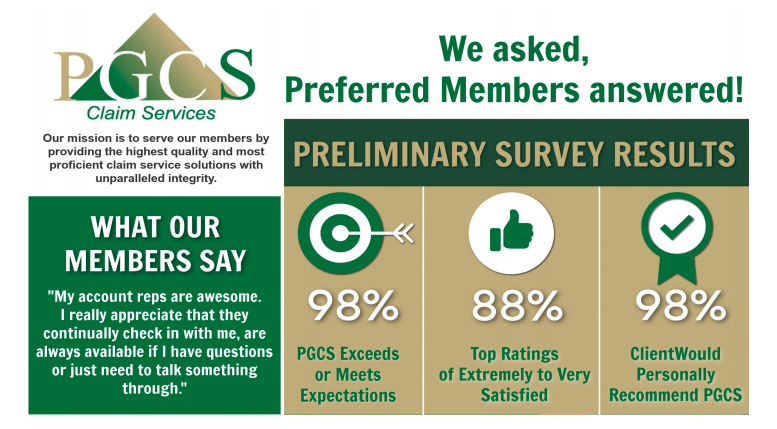Ask the Expert - Return to Work Program
By Cheryl Riley, Director of WC Claims – PGCS

As part of Preferred’s continuous improvement initiative to provide relevant / pertinent information to our Members, we have implemented a new section in the Preferred Newsletter referred to as “Ask the Expert”.
This section, which will be appear from time to time, is designed to serve the needs of Members by providing a question & answer format on a variety of insurance related topics.
For this edition of “Ask the Expert” we are going to have Cheryl Riley, Director of Workers’ Compensation Claims, from Preferred Governmental Claims Solutions (PGCS), respond to questions on the Return to Work Program.
Q: Cheryl, first would you explain what a Return to Work (RTW) or Transitional Duty policies is:
A: Transitional duty programs are an important part of an effective Return to work Program. It is designed to help an employee who suffers a work-related injury or illness to transition back into the workforce as quickly and safely as possible.
Q: What do you see as the biggest advantage to the employer that has a written policy?
A: Having a written policy benefits the employee as well as the employer. It gets your experienced employees back to work, helps to improve the ability to manage an injury with work restrictions and provides the ability to reduce the financial impact of workplace injuries.
Q: Is it important that the employer stay in touch with the injured worker?
A: Yes. It is very important for the employer to stay in touch with the injured worker. Having a return to work program for injured employees shows that the employer values their well-being and wants them back on the job as soon as possible. By having a return to work program, it benefits the employee in maintaining a productive mindset, staying on a regular work schedule, avoid dependency on the work comp system and provides a sense of job security and stability.
Q: On Average what would you say the reduction of the cost of the claim with an RTW policy is?
A: Research shows injured employees offered modified duties return to work twice as often as those who are not and spend half as many days on compensation.
Q: What is your feeling regarding time limits on Light Duty?
A: There are employers who put a time limit on their light duty policy. This is well documented in the Return to Work written program. These employers will offer modified duty for (xx) number of days. Because this written policy is included in the Return to Work program, the injured employee is aware of the time frame to be released to return to work full duty.
Q: What if the injured worker refuses to return to work?
A: If an injured worker is offered a modified duty position and refuses to return to work, benefits which would otherwise be payable by workers’ compensation would be denied. It is important to note a modified duty position must continually be offered to the injured worker for continuation of denial of benefits. For example: If modified duty work is offered on 01/01 and refused, it must again be offered every two weeks thereafter. It is highly recommended to ALWAYS make the modified duty offer verbally with a follow up in writing.
Q: Does there come a time when the employer can release the employee from his/her job while having a Workers’ Compensation claim?
A: There may come a time in which the employer is no longer able to accommodate modified duty restrictions. The employer must communicate their decision with the adjuster as the amount of benefits the injured employee will receive may be increased. It is highly recommended the employer discuss any separation of employment with counsel.
Q: Can you summarize the overall benefits of a Return to Work Program?
A: In summary I have addressed the benefits of a Return to Work program for employees. Equally important, the employer benefits from a Return to Work program include:
- Boosting morale
- Keeping injured employees safe and productive
- Demonstrating a consistent procedure
- Establishing solid communication and organization
- Enhancing injured employees’ self-worth
Having a formal Return to Work Program is a win-win for both the employer and the injured employee.
For assistance with developing and implementing a Return to Work Program please contact your Preferred Loss Control Consultant. In addition, Return to Work information is available thru the Risk Management Resource Center, for those Members that have their EPLI related coverages with Preferred.
Cheryl Riley, Director of WC Claims - PGCS: Cheryl is responsible for the overall management of the workers’ compensation team at PGCS. Cheryl began her career in the insurance industry with CNA in 1984. After joining United Self Insured Services in 2002, Cheryl transferred to PGCS in 2007. While at PGCS she has held the positions of Account Manager, Quality Assurance Manager and Workers’ Compensation Claim Manager prior to her current position of Director of WC Claims. Cheryl holds a Florida all lines claims adjuster license. Cheryl has also earned the designation of a Board Certified Workers’ Compensation Litigation Adjuster.
*Author contributions made by Pam Hancock, Senior Loss Control Consultant and Chris Kittleson, Director of Loss Control Technical Services

